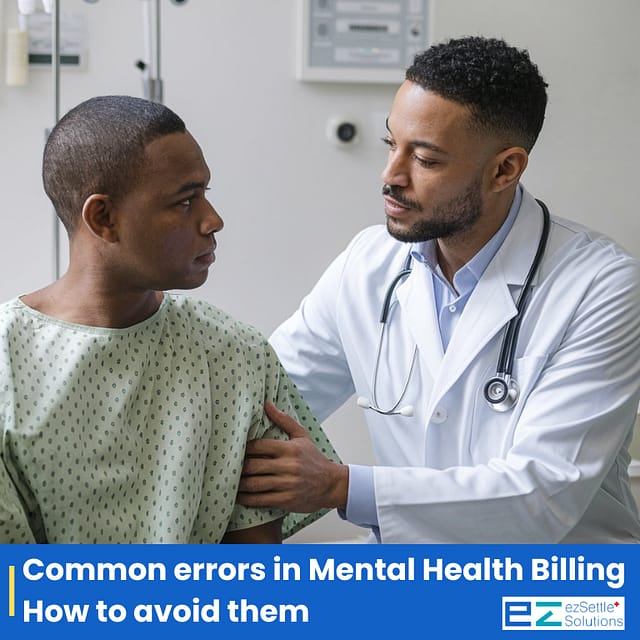
“Are billing errors draining your revenue and slowing your mental health practice’s growth?”
Accurate billing is crucial for mental health practitioners—not just for revenue generation but also for maintaining smooth operations. Yet, navigating the complexities of mental health billing can feel like walking through a minefield. If common errors are left unchecked, they can lead to denied claims, delayed reimbursements, and unnecessary administrative burdens.
We at EZ Settle Solution understand the importance of accuracy, which is why we offer a comprehensive mental health billing service that streamlines your reimbursement process.
In this blog, we will explore the most frequent mental health billing mistakes and offer actionable tips to avoid them.
Let’s help you ensure compliance, streamline your billing process, and focus on what truly matters – delivering exceptional care to your patients.
Mental health billing is complex due to unique codes, changing insurance policies, and diverse therapy formats. While other healthcare domains often have standardized billing processes, mental health services involve multiple variables, such as group therapy, telehealth sessions, and time-based billing. This complexity makes practices vulnerable to mistakes.
By recognizing these common errors and implementing preventive measures, you can save time, and improve cash flow.
Mental health billing comes with its own set of challenges, and even small mistakes can lead to rejected claims, delayed payments, or compliance issues.
Below are some common errors practitioners make and why avoiding them is crucial to maintaining a smooth revenue cycle.
Accurate procedure coding is essential in mental health billing, especially for time-based sessions. However, many practitioners need to verify its accuracy before using the same CPT code repeatedly.
Both ICD and CPT codes are frequently updated, and failing to use the most current versions is a common billing error.
Unbundling occurs when multiple codes are used for a procedure that should be billed under a single, comprehensive code.
Upcoding is when a provider bills for a higher-level service than was actually provided.
Modifiers are critical in mental health billing as they add important details about the service provided, such as location or method.
Submitting claims with incomplete or incorrect patient details – such as misspelled names, incorrect insurance ID numbers, or outdated policy information—is a widespread issue. Even minor discrepancies can result in rejected claims.
Insurance companies require detailed documentation to justify the medical necessity of services provided. Inadequate or vague documentation often leads to claim rejections.
How to Avoid It:
Certain mental health treatments require pre-authorization from insurance providers. Failing to obtain this approval can lead to claim denials or reduced reimbursements.
Managing mental health billing doesn’t have to be overwhelming. By proactively addressing common errors, investing in staff training, and leveraging technology, you can reduce claim denials, optimize reimbursements, and focus on patient care.
At EZ Settle Solution, we specialize in helping mental health practices like yours understand the complexities of medical billing. From accurate coding to claim submission and follow-up, we are here to ensure that your revenue cycle runs smoothly.
Ready to Eliminate Billing Errors?
Partner with EZ Settle Solution and let us handle your billing needs while you concentrate on providing quality care to your patients.
Contact us at 346-335-4093 / info@ezsettlesolutions.com or schedule a free consultation.